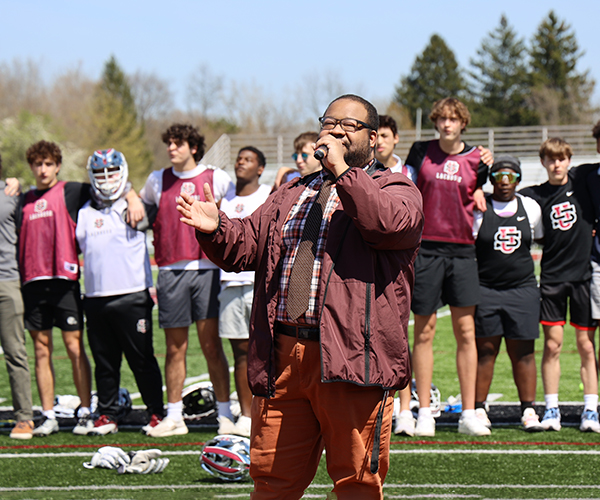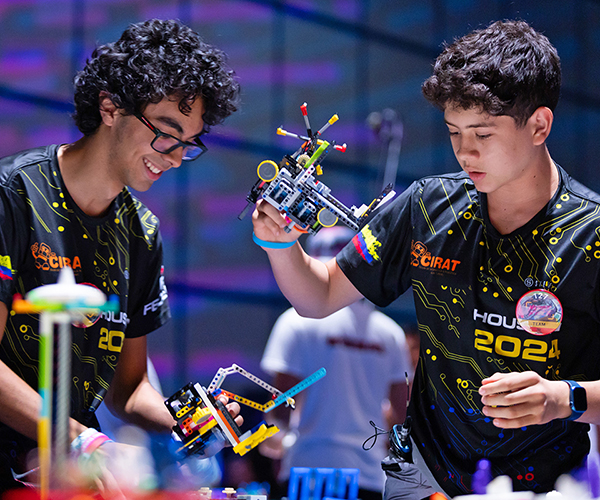Kids. Put 20 to 30 of them in a room and try teaching them. They’re jittery, curious, passive, sweet, aggressive, tired, energetic, challenging and — depending on their age — full of hormones.
Channeling their potential requires teachers who can manage discipline issues without turning into feared disciplinarians. In fact, the most effective teachers, the ones whose students perform well academically and get along with others, say that they seldom have to address discipline issues because they work hard to be teachers who kids don’t want to rebel against. They focus on building respect and showing their students that they’re important. Once a respectful relationship has been established, then they can get down to reading, writing and ’rithmetic.
So how can parents help ensure that their kids work hard in school and learn to get along with others? Here, some of Northeast Ohio’s brightest teachers share their tips for encouraging academic and social success.
Listen Up
Show your kids that you care, and chances are good they’ll instinctively make the choices you’d like them to. The best teachers work to make things interesting and understand kids want to be valued as humans more than they want algebra formulas. In kids’ minds, learning always takes a back seat to respect. When parents and teachers build respect, they’re modeling how to work with others — an essential life skill.
Channeling their potential requires teachers who can manage discipline issues without turning into feared disciplinarians. In fact, the most effective teachers, the ones whose students perform well academically and get along with others, say that they seldom have to address discipline issues because they work hard to be teachers who kids don’t want to rebel against. They focus on building respect and showing their students that they’re important. Once a respectful relationship has been established, then they can get down to reading, writing and ’rithmetic.
So how can parents help ensure that their kids work hard in school and learn to get along with others? Here, some of Northeast Ohio’s brightest teachers share their tips for encouraging academic and social success.
Listen Up
Show your kids that you care, and chances are good they’ll instinctively make the choices you’d like them to. The best teachers work to make things interesting and understand kids want to be valued as humans more than they want algebra formulas. In kids’ minds, learning always takes a back seat to respect. When parents and teachers build respect, they’re modeling how to work with others — an essential life skill.
“Kids have fascinating insights,” says Mark Storz, associate professor of education and allied studies at John Carroll University.
Storz, along with independent education consultant Karen Nestor, compiled a study based on interviews with more than 300 middle-school students and teachers from Cleveland urban schools. In the book that emerged from the study, titled “They Call Us to Justice,” Storz and Nestor note that their findings corroborate what effective teachers practice every day and suggest that when teachers focus on respecting their students, their students are more interested in learning than in making trouble.
“We need to listen to kids,” Storz says. “So often, teachers and even parents have misconceptions about kids, and as a result, they prejudge the kids inaccurately. When that happens, a huge learning opportunity has been lost. But when the kids are shown that they matter to the teacher, then they respond in a way that allows them to grow and learn.”
As one of the students quoted in Storz’s and Nestor’s study says: “They [the teachers] just need to maybe sit down and just show that they care. And if you want to be a good teacher, show that you care. Just help your students.”
Another student echoes: “When a teacher cares about me, it causes me to respect that teacher more and behave more as I should with them because they take their time to help me and I should take my time to help and respect them.”
Expect A Lot, Get A Lot
Teachers note that the best students usually come from families where an expectation for learning is set early.
Teachers note that the best students usually come from families where an expectation for learning is set early.
“Having a consistent set of expectations between parents and schools is helpful,” says Sharon Field, an English teacher at Riverside High School in Painesville Township. “When parents expect a lot out of kids and kids know that their teachers want the same things in terms of social and academic skills, that united front brings out a lot. Kids, especially teens, test their parents’ and teachers’ limits. So, we have to understand that’s what’s going to happen.”
Setting a consistent study time and place is effective, says Michael Shoaf, superintendent of Rocky River Public Schools. Make homework as routine as brushing teeth. “Parents can give some support, but keep it minimal,” he says. “Don’t fight about it. In most cases, kids can study on their own. Expect it. They need to know that their parents think studying is important, and by establishing a routine, parents provide a concrete example.”
Doug Snyder, an English teacher at Chardon High School, says students usually respond to a clear link between what’s being taught in the classroom and how it will impact their lives, and he urges parents to make connections between academics and their kids’ lives. “I’ll tell my students what life will be like for them without a diploma,” he says. “And that’s just the beginning. They may not want to study grammar, but when I show them what someone who speaks poorly sounds like, and discuss that person’s chances at getting a good job versus someone who is educated, something clicks. Then they care. Kids want to know how what they’re being forced to learn will benefit them. And that’s fair.”
Don’t assume that kids want the easy way out; many teachers say their students push teachers to challenge them. Several students in Storz’s and Nestor’s study voiced such concerns. “Sometimes I don’t think I’m being challenged enough,” one said. “So I’m not able to renew my skills and what I already know.” Classmates in the discussion backed her up: “That’s right, because some of our classes are just way too easy for us.”
Find a Way In
Melissa Becerra, a second-grade teacher at Boulevard Elementary in Shaker Heights, says learning and behavior go together, and that it’s helpful to be curious and pay attention to what students want.
Melissa Becerra, a second-grade teacher at Boulevard Elementary in Shaker Heights, says learning and behavior go together, and that it’s helpful to be curious and pay attention to what students want.
She notes one particular student who was having a difficult time reading. “I worked and worked with this girl, and finally I noticed that she just didn’t care about any of the topics we were reading about,” she recalls. “I knew she loved horses, so I found three books about horses, and I pulled her aside and sat with her and read. I built off of her interest, not the other way around. And it worked. Her reading skills improved and her confidence and improved ability spilled over into other subjects.”
Although it would be great if learning and behavior grew at a predicable rate, kids don’t always progress on a schedule, especially socially. When a child makes an “oops,” she needs to know that not only is she responsible for her decision, but she also has the power to change things for the better. “I stress that kids always have the power to turn it around,” says Becerra. “It’s great when you hear them say that. ‘I have the power to turn it around!’ They know they are important.”
Address Bullying
Interestingly, many students in Storz’s study said they learn bullying and fighting from home; they simply act out the ways they see adults handle problems.
Interestingly, many students in Storz’s study said they learn bullying and fighting from home; they simply act out the ways they see adults handle problems.
“Every time we interact with kids, we’re teaching,” Storz says. “Kids often learn bullying from the adults in their lives. But conflicts present an opportunity to demonstrate problem solving.”
Nordonia High School in Macedonia uses peer mediation to address confrontations. Principal Charles Vrabel says that having clear consequences for violent behavior also helps head off problems. “We teach that everyone has choices,” Vrabel says. “How kids handle their lives is up to them; they have the choice to engage in conflicts or not, but by making smart choices, they can lead productive lives. Kids don’t just wake up one morning and say, ‘I’m going to beat someone up today.’ They bully because that’s what they’ve been exposed to and they don’t know how else to act.”
Getting students to understand they actually have options can be a breakthrough. They may have never considered they don’t have to use their fists to solve a dispute.
Shoaf, who was previously superintendent for Painesville Township Schools, says the Diversity Council of Cleveland made a difference there in helping students respect others’ differences. “Respect is a big first step,” he says. “And then they need to know the avenues available to them to deal with stresses. Kids need someone to talk to.”
Handle Substance Abuse
Kids interact with kids who use and sell pills, cigarettes and alcohol. It’s folly to assume that anyone is immune to the friend of a friend who’s got a couple joints to share. And it’s ridiculous to believe that your kid won’t feel at least a twinge of curiosity to try.
Kids interact with kids who use and sell pills, cigarettes and alcohol. It’s folly to assume that anyone is immune to the friend of a friend who’s got a couple joints to share. And it’s ridiculous to believe that your kid won’t feel at least a twinge of curiosity to try.
Know the warning signs, Shoaf says. Changes in routines, friends, depression, dropping grades and other activities can signal problems. “Know their friends, know where they’re going and when they’re coming back,” he says. “Be up when they get home. It’s hard to impress the magnitude of the negative consequences that could affect them from drugs. Fifteen-year-old kids don’t understand. So parents need to be vigilant.”
Being available for students is something Field says is an important part of her job. Sometimes all a kid needs is a friendly ear.
If Field detects abnormal behavior beyond a string of a few bad days, then she’ll intervene. “Kids need to know they matter,” she says. “If parents stay involved in their kids’ lives, those kids are going to realize they matter. And as a teacher I notice when a kid is acting differently. If I suspect substance abuse, I bring in a counselor or nurse right away.”
The Bottom Line: Teach Respect, Give Respect
“A professor in one of my education classes once said, ‘Kids don’t care about what you know until they know that you care,’ ” Snyder recalls. “That’s the challenge of a good teacher.”
“A professor in one of my education classes once said, ‘Kids don’t care about what you know until they know that you care,’ ” Snyder recalls. “That’s the challenge of a good teacher.”
Snyder says kids today are bombarded with far more distractions and responsibilities than in past generations. Many teenagers have after-school jobs, have friends who may be experimenting with drugs or alcohol, or may have learning disorders. And while every kid is going to have good and bad days, he says that getting them to relate to “Macbeth” and pass the Ohio Graduation Test is still his job regardless of the distractions. “I may be providing the best 43-minute period of the day to demonstrate being a good role model, and that means I have to set an example that shows I care about others,” he says. “That in itself is a lesson, and then comes teaching ‘Hamlet.’ ”
But knowing how to handle problems appropriately isn’t cut-and-dried. Kristen Stephens, a math teacher at Rocky River High School, rarely has negative issues, largely because she spends a lot of energy building trusting relationships. When she does have a problem, however, Stephens uses what she knows about that particular kid to direct how she’ll deal with it. “No one wants to be a problem for someone they respect,” she says. “There’s a lot riding on the integrity of our relationship.”
Stephens says if someone makes a negative comment to her, sometimes the best thing she can do is laugh. But with a different kid, it’s more effective to ask the student ‘Did you really just say that?’ Sometimes she may move them to another desk or send them into the hall.
“The real issue is that these kids have to believe that I want them to succeed,” she explains. “I hold no secret knowledge. They have to know that I value them and want them to learn, and getting to that point takes respect on both sides.”
Respect is often misunderstood between generations. “Adults often think of respect in terms of compliance,” Nestor says. “They think it’s important to be quiet, do homework, be on time, have supplies and listen. But kids don’t think that way. The first thing they want is to know someone cares about them, so it’s vital that we put kids at the center of everything we do. Don’t underestimate what they’re picking up from you — positive and negative.”



